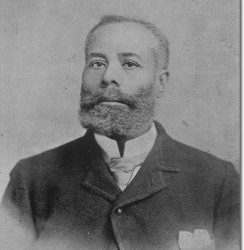Elijah McCoy was born in Colchester, Ontario, Canada, on 2 May 1844. His parents were George and Emillia McCoy, former slaves from Kentucky who escaped through the Underground Railroad. George joined the Canadian Army, fighting in the Rebel War and then raised his family as free Canadian citizens on a 160 acre homestead.
At an early age, Elijah showed a mechanical interest, often taking items apart and putting them back together again. Recognising his keen abilities, George and Emillia saved enough money to send Elijah to Edinburgh, Scotland, where he could study mechanical engineering. After finishing his studies as a “master mechanic and engineer”, he returned to the United States to pursue a career in his field.
However, the only job he found was that of a locomotive fireman and oiler for the Michigan Central Railroad. The fireman on a train was responsible for fueling the steam engine, and the oiler lubricated the engine’s moving parts as well as the train’s axles and bearings. Because of his training, he was able to identify and solve the problems of engine lubrication and overheating. At that time, trains needed to periodically stop and be lubricated to prevent overheating. Elijah McCoy developed a lubricator for steam engines that did not require the train to stop. His lubricator used steam pressure to pump oil wherever it was needed.
Elijah McCoy was issued his first patent on 12 July 1872 for his improvement in lubricators for steam engines. McCoy continued to improve upon his design and invented several more improvements. Railroad and shipping lines began using McCoy’s new lubricators, and the Michigan Central Railroad promoted him to an instructor in the use of his new inventions. Later, Elijah McCoy became a consultant to the railroad industry on patent matters.
Elijah McKoy’s inventions were used so extensively by other companies that no piece of heavy duty machinery was considered safety proof unless it had the McKoy brand. To make sure a new piece of machinery had automatic lubrication, the inspector would ask, ” Is It The Real McKoy.”
McKoy died on 10 October 1929.






Leave a Reply